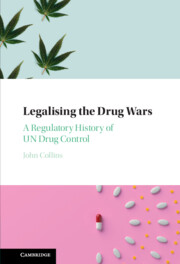Refine search
Actions for selected content:
27 results
Flower of Endurance: An Ethnography of Opium’s Untold Role in Iran’s Capitalist Margins
-
- Journal:
- Iranian Studies ,
- Published online by Cambridge University Press:
- 28 October 2025, pp. 1-27
-
- Article
-
- You have access
- Open access
- HTML
- Export citation
Chapter 11 - Opium’s Imperial Intimacies
- from Part III - Applications
-
-
- Book:
- Commodities and Literature
- Published online:
- 14 October 2025
- Print publication:
- 09 October 2025, pp 194-210
-
- Chapter
- Export citation
8 - The Nineteenth-Century Encounter of Civilizations
-
- Book:
- A History of East Asia
- Published online:
- 15 May 2025
- Print publication:
- 05 June 2025, pp 226-267
-
- Chapter
- Export citation
Opium's Reverse Course: A Story of Shifting Winds
-
- Journal:
- Asia-Pacific Journal / Volume 20 / Issue 18 / October 2022
- Published online by Cambridge University Press:
- 14 March 2025, e3
-
- Article
-
- You have access
- Open access
- Export citation

Berlioz: Symphonie Fantastique
-
- Published online:
- 30 November 2023
- Print publication:
- 30 November 2023
Chapter 18 - ‘Writing Grows a Habit’
-
-
- Book:
- The Cambridge Companion to Byron
- Published online:
- 02 November 2023
- Print publication:
- 16 November 2023, pp 292-304
-
- Chapter
- Export citation
1 - A Brief History of Opioid Misuse and Addiction
- from Part I - The Origins of Addiction
-
- Book:
- The Opioid Epidemic
- Published online:
- 07 October 2023
- Print publication:
- 12 October 2023, pp 3-11
-
- Chapter
- Export citation
The Long-Run Consequences of The Opium Concessions for Out-Group Animosity on Java
-
- Journal:
- World Politics / Volume 74 / Issue 3 / July 2022
- Published online by Cambridge University Press:
- 25 May 2022, pp. 405-442
- Print publication:
- July 2022
-
- Article
- Export citation
6 - Dividing Up the Global Licit Market, 1948–1953
-
- Book:
- Legalising the Drug Wars
- Published online:
- 25 November 2021
- Print publication:
- 02 December 2021, pp 135-158
-
- Chapter
- Export citation
5 - Old Battles Anew at the UN Commission on Narcotic Drugs, 1946–1948
-
- Book:
- Legalising the Drug Wars
- Published online:
- 25 November 2021
- Print publication:
- 02 December 2021, pp 113-134
-
- Chapter
- Export citation
Introduction
-
- Book:
- Legalising the Drug Wars
- Published online:
- 25 November 2021
- Print publication:
- 02 December 2021, pp 1-12
-
- Chapter
- Export citation
2 - International Drug Control in Wartime, 1939–1945
-
- Book:
- Legalising the Drug Wars
- Published online:
- 25 November 2021
- Print publication:
- 02 December 2021, pp 25-69
-
- Chapter
- Export citation
8 - Assessing the Legal Legacy of the Single Convention
-
- Book:
- Legalising the Drug Wars
- Published online:
- 25 November 2021
- Print publication:
- 02 December 2021, pp 189-203
-
- Chapter
- Export citation
3 - Creating the UN Commission on Narcotic Drugs, 1945–1946
-
- Book:
- Legalising the Drug Wars
- Published online:
- 25 November 2021
- Print publication:
- 02 December 2021, pp 70-89
-
- Chapter
- Export citation
9 - Conclusion: UN Drug Control in the Twenty-First Century
-
- Book:
- Legalising the Drug Wars
- Published online:
- 25 November 2021
- Print publication:
- 02 December 2021, pp 204-224
-
- Chapter
- Export citation
1 - Drug Diplomacy from the Opium Wars through the League of Nations, 1839–1939
-
- Book:
- Legalising the Drug Wars
- Published online:
- 25 November 2021
- Print publication:
- 02 December 2021, pp 13-24
-
- Chapter
- Export citation
7 - From the 1953 Protocol to the 1961 Single Convention
-
- Book:
- Legalising the Drug Wars
- Published online:
- 25 November 2021
- Print publication:
- 02 December 2021, pp 159-188
-
- Chapter
- Export citation
4 - Reconstructing Drug Control in Europe, Asia and the Middle East
-
- Book:
- Legalising the Drug Wars
- Published online:
- 25 November 2021
- Print publication:
- 02 December 2021, pp 90-112
-
- Chapter
- Export citation

Legalising the Drug Wars
- A Regulatory History of UN Drug Control
-
- Published online:
- 25 November 2021
- Print publication:
- 02 December 2021
3 - Chinese Non-Traditional Security Governance in the Greater Mekong Subregion
-
- Book:
- Fractured China
- Published online:
- 21 October 2021
- Print publication:
- 28 October 2021, pp 121-165
-
- Chapter
- Export citation
